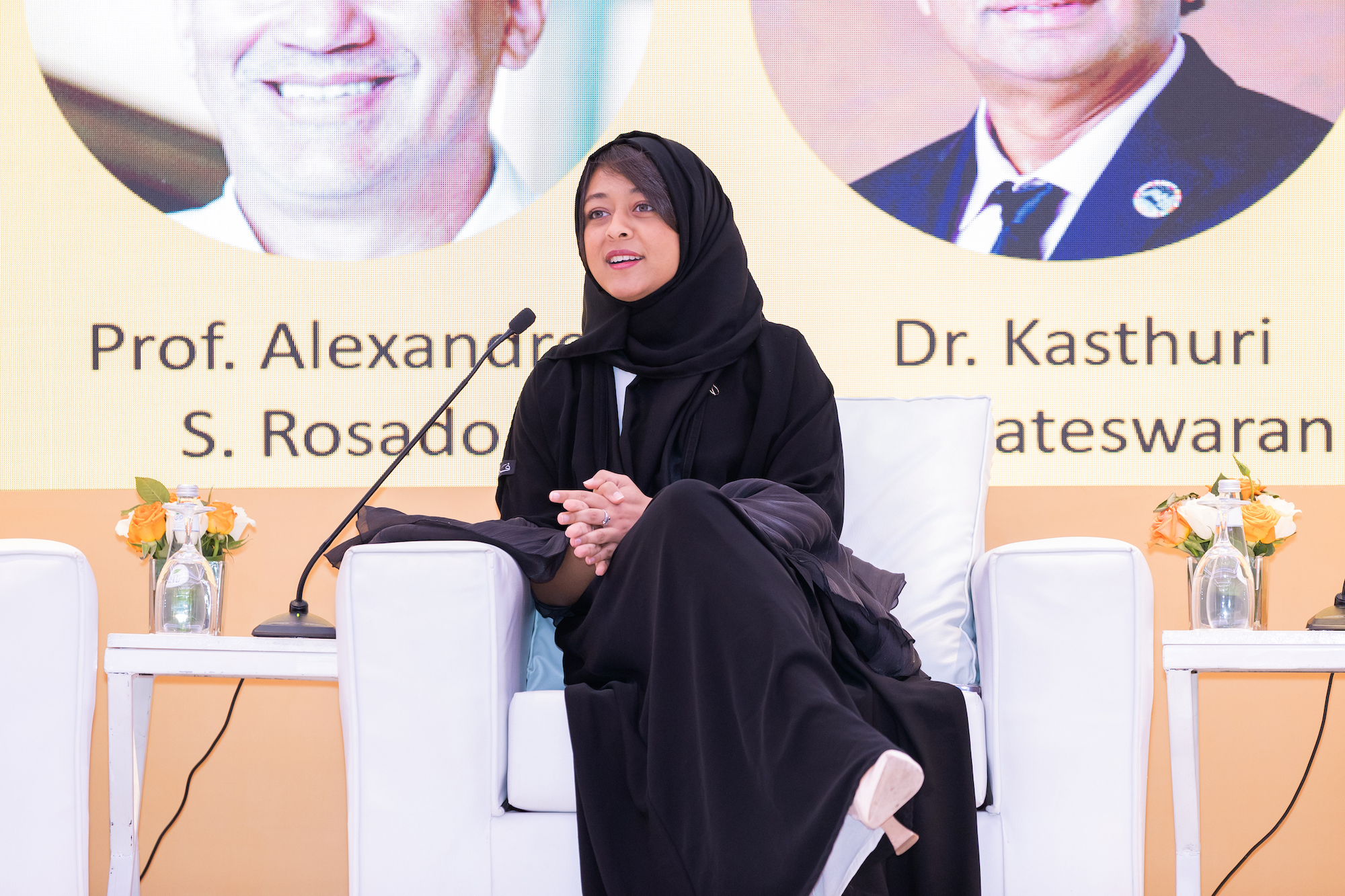KAUST Smart Health Initiative holds conference to accelerate impact in KSA through health and wellness

Ms. Rayyanah Barnawi, Research Laboratory Specialist and the first Saudi female astronaut
The KAUST Smart Health Initiative (KSHI) held its annual conference on November 1-2 in King Abdullah University of Science and Technology (KAUST). The event was a unique opportunity to showcase KSHI scientists and collaborations in the field of health and wellness, one of the key priorities of the Kingdom.
KAUST President Professor Tony Chan opened the event "Health and Wellness: Accelerating Impact in KSA" and underlined the significance of bringing together leaders in science and public health from a wide range of clinical, academic, government, NGO and health industry institutions to discuss breakthroughs and strategies for the advancement of precision and personalized medicine in the Kingdom and beyond.
The event included high-level keynote speakers and panel discussions, as well as over 40 scientific talks and a poster exhibition featuring 20 KAUST research labs.
The undoubted highlight of the event was the participation of Ms. Rayyanah Barnawi, Saudi's first female astronaut. Her achievements in space were celebrated on the evening of November 1, where she shared her experience as a scientist in space. She joined the “Space Medicine” panel along with NASA scientists Dr. Satish K. Mehta and Dr. Kasthuri Venkateswaran, as well as Professor Alexandre S. Rosado (KAUST) and Dr. Khalid Abu Khabar (King Faisal Specialist Hospital and Research Center) to discuss her experience.

(left to right) Dr. Khalid Abu Khabar, Chairman, Molecular BioMedicine Department, KFSHRC; Dr. Satish K. Mehta, Senior Scientist, Biomedical Research and Environmental Sciences, Johnson Space Center, NASA, USA; Ms. Rayyanah Barnawi, Research Laboratory Specialist and the first Saudi female astronaut; Dr. Kasthuri Venkateswaran, Senior Research Scientist, NASA – Jet Propulsion Laboratory, USA; Prof. Alexandre S. Rosado, Professor of Bioscience, KAUST.
"We carried out 14 scientific experiments, some of which were conducted in the space station for the first time in history. These experiments focused on medicine and technology, as well as educational experiments for students in schools," recounted Ms. Barnawi about her mission.
Highlighting the potential impact of space medicine on the well-being of individuals on our home planet, she underscored, "Without the exploration of space roughly six decades ago, essential innovations like CT scans and MRIs, now integral to our daily lives, might never have materialized."
The panelists also discussed how the human microbiome — the viruses and microbes that are present in our body and responsible for our health — respond to microgravity.
KSHI Director and Vice President for Research at KAUST Professor Pierre Magistretti moderated a panel that brought together the Deans of the three Divisions at KAUST, Professor Iain Young Iain Young (BESE), Professor Gianluca Setti Gianluca Setti (CEMSE) and Professor Chak Chan Chak Chan (PSE), who exchanged views about the importance and benefits of cross-disciplinary research. A third panel involving KAUST Professors Imed Gallouzi (KSHI Associate Director & COO), Leena Ibrahim and Ricardo Henao and Dr. Nabeel Goheer (Executive Director of PATH) discussed new educational approaches and the implications of artificial intelligence (AI) and machine learning to train the next generation of scientists, doctors and healthcare professionals
Dr. Mehmood Khan, CEO of the Hevolution Foundation, gave an inspirational keynote speech introducing the Hevolution Foundation, the first Saudi nonprofit organization with the mission to pursue age-related therapeutic breakthroughs through funding global scientific discovery and investing in private companies and entrepreneurs. The primary goal of Hevolution is to accelerate scientific progress to mitigate the impact of aging and promote healthier lifestyles.

(left to right) Dr. Najah Ashry,Vice President, Strategic National Advancement KAUST; Dr. Hani Johkdar, Deputy Minister for Public Health, MoH Saudi Arabia; HRH Princess Dr. Haya Bint Khaled Bin Bandar Al Saud, Vice President of Organizational Strategy & Development, Hevolution Foundation; Dr. Mehmood Khan, CEO, Hevolution Foundation; Prof. Imed Gallouzi, Professor of Bioscience, Chief Operating Officer (COO) and Associate Director of KAUST Smart Health Initiative; Dr. Mahmoud Alyamani, Health, Well-Being, and Biotech Sector Head, NEOM; Prof. Pierre Magistretti, Distinguished Professor, Bioscience, Vice President for Research, Director, KAUST Smart Health Initiative; Dr. Khalid Abu Khabar, Chairman, Molecular BioMedicine Department, KFSH&RC
KSHI also had the privilege of welcoming Dr. Ehsan Hoque, Chief Scientist at the National Center for AI of the Saudi Data and AI Authority (SDAIA). He discussed the various projects led by SDAIA and his team to leverage AI and machine learning to achieve early diagnosis of neurological disorders such as Parkinson and autism.
On the second day, Dr. Mahmoud Alyamani, Head of NEOM-Health Wellbeing and Biotech (NEOM-HWB) introduced the ambitious and futuristic plan of NEOM to use cutting edge AI and ML tools for disease prevention. He highlighted the importance of NEOM and KAUST working together to establish the most advanced and comprehensive "digital twins" to open the door for new approaches to promote a healthier society.
KAUST and NEOM shook hands on future alliances and signed a memorandum of understanding for collaborative research on biobanking, AI and wearable sensor technologies.

MOU signing: (left to right): Prof. Pierre Magistretti, Distinguished Professor, Bioscience, Vice President for Research, Director, KAUST Smart Health Initiative; Dr. Mahmoud Alyamani, Health, Well-Being, and Biotech Sector Head, NEOM
Finally, the scientific talks provided an opportunity to showcase KSHI achievements in several health-related topics, including cancer treatments, wound healing, computer vision and AI in diagnostics. The participation of leaders and scientists from partner institutions such as King Faisal Specialist Hospital and Research Center and Alfaisal University clearly demonstrated that interdisciplinary collaborations and partnerships are key to successfully tackling critical health challenges.
"Our annual conference aims to showcase KSHI achievements during the last three years and KAUST’s ability to establish partnerships with national and international leading institutions to
build cutting-edge tools and platforms that improve healthcare delivery in KSA and the world," said KSHI COO Professor Imed Gallouzi.

